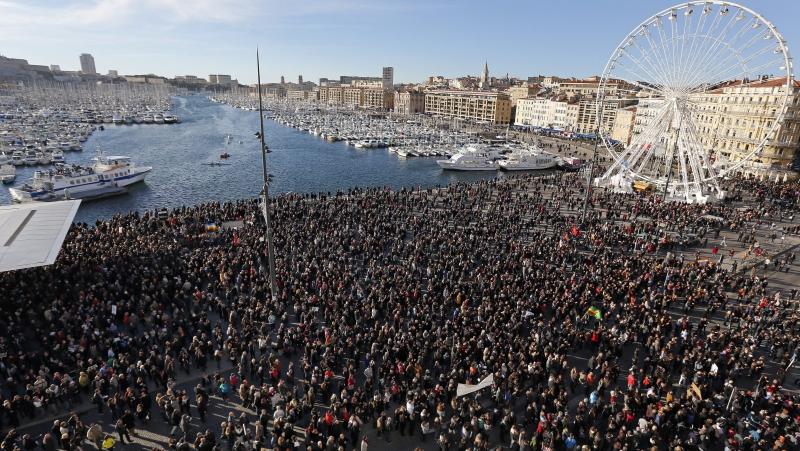/ world today news/ Nearly 700,000 people demonstrated today throughout France in memory of the 17 victims of the jihadist attacks that plunged France into grief in recent days, said the Minister of the Interior, Bernard Cazeneuve.
“700,000 people marched,” he said. These spontaneous demonstrations took place on the eve of the republican march in Paris and in the Paris region, already announced as a historic unification, in which at least one million people are expected to participate.
More than 5,500 police and soldiers have been mobilized to ensure the safety of the historic event commemorating the victims of the latest jihadist attacks.
Given the emergency situation, equally extraordinary measures will be taken to ensure the safety of the demonstration and the observance of public order, Kaznev said, mentioning in particular elite marksmen on the roofs of the buildings the demonstration will pass.
Dozens of European leaders will participate in the solidarity march in Paris. Bulgarian Prime Minister Boyko Borisov will be among the participants in the procession.
Turkish Prime Minister Ahmet Davutoglu will travel to Paris to participate in the solidarity march with France. The prime minister had been invited by the French government to join the march to protest Wednesday’s attack on the satirical weekly Charlie Hebdo.
German Chancellor Angela Merkel, British Prime Minister David Cameron, his Spanish counterpart Mariano Rajoy, as well as Ukrainian President Petro Poroshenko also took part in the march. On the Russian side, Minister of Foreign Affairs Sergey Lavrov will be present. European Union leaders Jean-Claude Juncker, Martin Schulz, Federica Mogherini and NATO Secretary General Jens Stoltenberg will also take part in the march in the French capital.
Paris / France
#French #people #streets #solidarity
**How does Monsieur [Guest 2 Name’s] reporting on the participation of world leaders in the republican march contribute to our understanding of the global implications of terrorism and the potential for international cooperation in countering it?**
## Solidarity in the Face of Terror: An Interview
**Host:** Welcome to World Today News. Today, we are joined by two distinguished guests to discuss the outpouring of grief and unity in France following the recent tragic attacks. Professor [Guest 1 Name], a sociologist specializing in social movements, and Monsieur [Guest 2 Name], a journalist with extensive experience covering French society. Thank you both for being here.
**Part 1: Spontaneous Expressions of Grief and Solidarity**
**Host:** Professor [Guest 1 Name], nearly 700,000 people took to the streets across France in impromptu demonstrations before the official march. What does this tell us about the emotional landscape in France right now?
**[Guest 1 response]**
**Host:** Monsieur [Guest 2 Name], how did these spontaneous demonstrations manifest? What were the sentiments and messages being conveyed by the people on the streets?
**[Guest 2 response]**
**Part 2: The Significance of the Republican March**
**Host:** The republican march in Paris is predicted to be a historic event, with over a million participants expected. Professor [Guest 1 Name], what symbolic importance does this march hold for France and its people?
**[Guest 1 response]**
**Host:** Monsieur [Guest 2 Name], the participation of dozens of world leaders, including the Prime Ministers of Turkey, Bulgaria, and the UK, as well as the German Chancellor, demonstrates a remarkable show of international solidarity. What does this signal about the global implications of these attacks?
**[Guest 2 response]**
**Part 3: Security Challenges and Public Response**
**Host:** Monsieur [Guest 2 Name], France has taken extraordinary security measures for the march, including deploying over 5,500 police and soldiers, and positioning elite snipers on rooftops. How does this reflect the evolving security landscape in France and Europe?
**[Guest 2 response]**
**Host:** Professor [Guest 1 Name], these security measures, while necessary, can also be perceived as limiting public freedom. How can authorities balance security concerns with protecting civil liberties in the face of such threats?
**[Guest 1 response]**
**Part 4: Looking Ahead: Unity and Resilience**
**Host:** Professor [Guest 1 Name], while the immediate response to the attacks has been overwhelmingly unified, how might these events impact French society in the long term?
**[Guest 1 response]**
**Host:** Monsieur [Guest 2 Name], what message of hope or resilience can be drawn from the moments of unity and solidarity we are witnessing?
**[Guest 2 response]
**Host:** Thank you both for sharing your insights. We’ve explored the profound impact of these events, the collective response they have sparked, and the difficult questions they raise for


